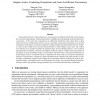122 search results - page 6 / 25 » Memory models for open-nested transactions |
PPOPP
2009
ACM
14 years 8 months ago
2009
ACM
Due to power wall, memory wall, and ILP wall, we are facing the end of ever increasing single-threaded performance. For this reason, multicore and manycore processors are arising ...
IISWC
2009
IEEE
14 years 2 months ago
2009
IEEE
— Programming to exploit the resources in a multicore system remains a major obstacle for both computer and software engineers. Transactional memory offers an attractive alternat...
ISPASS
2010
IEEE
13 years 9 months ago
2010
IEEE
Abstract—Transactional memory promises to generalize transactional programming to mainstream languages and data structures. The purported benefit of transactions is that they ar...
IEEEPACT
2009
IEEE
13 years 5 months ago
2009
IEEE
Transactional memory is being advanced as an alternative to traditional lock-based synchronization for concurrent programming. Transactional memory simplifies the programming mode...
POPL
2009
ACM
14 years 2 months ago
2009
ACM
Transactional memory (TM) provides a safer, more modular, and more scalable alternative to traditional lock-based synchronization. Implementing high performance TM systems has rec...


